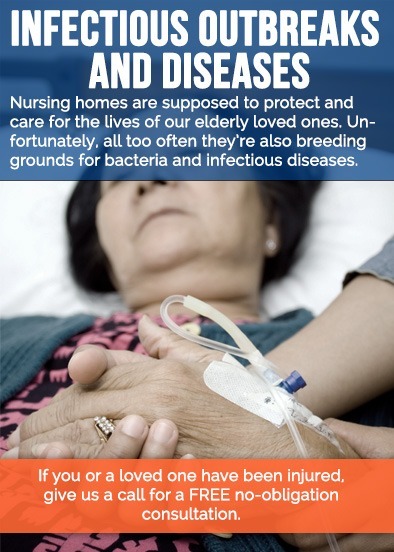 Nursing homes are supposed to protect and care for the lives of our elderly loved ones. Unfortunately, all too often they’re also breeding grounds for bacteria and infectious diseases.
Nursing homes are supposed to protect and care for the lives of our elderly loved ones. Unfortunately, all too often they’re also breeding grounds for bacteria and infectious diseases.
When infection breaks out in an elder care facility, it can move quickly from resident to resident—and the results can be tragic. Nursing homes have an obligation to train all staff to prevent and minimize infectious outbreaks.
When they don’t, otherwise healthy loved ones may become severely ill. In some cases they may even lose their lives.
If you or your loved one has been affected by an infectious outbreak at an Atlanta nursing home, you should speak to an elder abuse lawyer. John Foy & Associates has a team of some of the most experienced elder care lawyers in Georgia.
Call us at 404-400-4000 and get a free consultation on your case today.
How Common Are Infectious Outbreaks in Nursing Homes?
Infections are sadly very common in nursing homes. One review of nursing home data found that there are over 1.5 million people living in nursing homes in the United States, but they experience 2 million infections annually.
That means that a single nursing home patient is at risk of more than one infection per year.
In practice, many nursing home patients will enjoy their residence infection-free. Unfortunately, others will face multiple infections at the same time. Nursing homes can be described as a “perfect storm” of conditions for infections to spread. For example:
- Residents bring a variety of health conditions with them, including bacteria and existing diseases that need to be managed. These infections can often move from person to person within the facility.
- Many elders are recovering from surgery or suffer from occasional open sores. Any wound is susceptible to infection.
- Nursing homes typically have a high number of residents living in relatively small rooms. In some cases, multiple residents share one room. Living in close quarters like this makes it much easier for infection to spread.
- Many activities are done in large groups. Residents may take their meals together, watch TV and play games together, or participate in group social activities.
- The staff who care for residents with infections typically move room to room and care for other residents as well.
All nursing homes are aware of these risks and a good nursing home will take precautions to prevent the spread of infection.
Get the strong arm
How Serious Are Infectious Outbreaks and Infectious Diseases for the Elderly?
A single outbreak of infection can have serious consequences. For example, in one documented outbreak, an influenza A infection spread through a 37-bed nursing home unit. More than a fourth of the exposed patients developed the infection, even though most had already received influenza vaccine. Tragically, 6 out of 11 infected patients lost their lives.
Infections can be serious in any care facility, but they are especially dangerous for the elderly. Many seniors already have a compromised immune system or are already battling multiple health conditions.
Seniors may take longer to recover from a condition, and may experience more complications than a younger patient would. The result is that infectious diseases among seniors are disproportionately lethal.
The numbers back this up. Infections are one of the leading causes for a senior to be moved from a nursing home to a hospital, and also a leading cause of death. As many as 380,000 people die of infections in long term care facilities every year.
Can Nursing Homes Control or Prevent Infection?
Yes. Although no facility can guarantee a truly infection-free environment, there are best practices that care facilities must use. These practices are designed to diagnose infections early, respond to them appropriately, and give residents the care they need. They are also designed to maintain a sterile environment and minimize the spread of infection when it does occur.
These practices include:
- Reducing the use of catheters, which can lead to urinary tract infections
- Changing diapers more frequently
- Proper hand hygiene and hand sanitizing among staff, including the use of gloves, gowns and masks
- Requiring visitors to observe hygiene practices
- Handling linens in a way that minimizes the spread of infections
- Routine screening of all residents for common infections
- Isolating residents with infectious conditions
These are basic medical practices that have been understood for decades. They have a proven effect to reduce infectious outbreaks. Every year, many infections and deaths would have been avoided if a facility had observed these simple principles.
Is a Nursing Home Liable for Infection Among Their Residents?
Yes. The law is clear that nursing homes must take measures to prevent and minimize infection. If they don’t, they have been negligent in their care of the elderly.
Federal law requires every nursing home to have an Infection Control Program. All staff must be trained on the practices that effectively reduce the spread of infection. Unfortunately, we commonly see several problems in Georgia nursing homes:
- Not all staff are well trained on infection prevention
- Staff are overworked and corners get cut
- Some parts of the Infection Control Program are enforced, but not others
Any of these, or any other situation where residents are put at undue risk of infection, can represent negligence. When a nursing home is negligent, it’s liable for the consequences—including added care costs, medical bills, pain, and even the loss of a life.
If your loved one has suffered from an infectious disease in a nursing home, you have options. Their infection may have been preventable. There is no way to undo the harm that an infection can cause, but if the nursing home was careless, you do have a right to recover your costs. You should speak to an elder care abuse lawyer today.
John Foy & Associates is one of the best Georgia elder abuse law firms. We focus our entire practice on helping individuals and families get justice. We offer a FREE consultation and we charge you nothing unless we can achieve a financial recovery for you.
Call 404-400-4000 and get your free consultation today.
404-400-4000 or complete a Free Case Evaluation form





